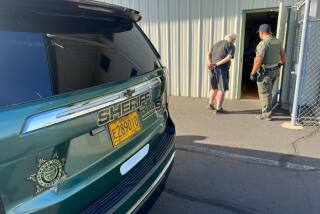Detective Says He Doubted Inmate’s Story
- Share via
The defense investigator who tape-recorded a prisoner saying that executed serial killer William Bonin committed the 1979 murder of a Costa Mesa teenager testified Tuesday that he doubted some of the inmate’s details.
Gilbert Brisco, a retired Los Angeles County Sheriff’s Department deputy working for the defense team of James Lee Crummel, the man charged with killing 13-year-old James “Jamie” Trotter, said during a hearing that he was skeptical of some information state prisoner James Munro provided in two January interviews.
Crummel’s defense attorneys are trying to persuade Riverside Superior Court Judge Dennis A. McConaghy to allow them to introduce at trial the theory that Bonin killed Trotter. McConaghy said he would rule Monday, before Crummel’s jury trial is scheduled to begin.
Munro, convicted as an accomplice to Bonin in a 1980 murder, has since recanted his story about the so-called Freeway Killer’s involvement in Trotter’s death. Crummel’s lawyers contend that Munro has recanted his recorded story because he wants the parole board to see him as cooperating with law enforcement authorities instead of defense attorneys.
Noting that Munro detailed Trotter’s shoe size in a recorded interview about Bonin’s involvement in the murder, prosecutor Bill Mitchell asked Brisco, “You’re a trained investigator. Did you believe [Munro]?”
Said Brisco: “My thoughts were [Munro] was either there and saw it, or it was a stab in the dark.”
“A stab in the dark -- that he was lying?” Mitchell asked.
“I had my doubts, I tell you that,” Brisco said.
Brisco also said he doubted Munro’s statement that he had tried to tell authorities about Bonin’s “confession” of the Trotter murder, going as far as offering to draw a map to Trotter’s body. Munro, in a recorded conversation played in court Tuesday, said, “[Police] said, ‘All we’re concerned about is the 14 [other] murders.’ ”
Trotter disappeared on his way to school in Costa Mesa in April 1979. In 1990, Crummel told authorities that he had found human bones near Ortega Highway in Riverside County; the bones were identified as Trotter’s in 1996. The following year, authorities, after researching Crummel’s criminal background, charged him with the molestation and murder of Trotter, making him eligible for the death penalty.
“The law and the evidence are on our side,” said Mary Ann Galante, Crummel’s attorney. “We have taped direct statements by Munro saying Bonin did it.”
But Mitchell said outside court Tuesday that he believed he had effectively argued that Munro’s statements about Bonin were fabricated. Mitchell also criticized Brisco for not applying a higher standard to his investigation, saying, “He knew it was [garbage] and wrote [the report] out anyway.
“The [defense attorneys] have to establish that the underlying declaration [Munro’s statements] are trustworthy. They haven’t told us when Bonin could have ever said this to Munro, and under what circumstances. All they have is Munro, and [he] is so inherently unbelievable, this [theory] shouldn’t come in.”
More to Read
Sign up for Essential California
The most important California stories and recommendations in your inbox every morning.
You may occasionally receive promotional content from the Los Angeles Times.











